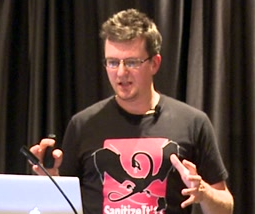Using Monads in C++ to Solve Constraints: 3. The Tale of Two Monads—Bartosz Milewski
Bartosz Milewski continues to explain how to use Monads in C++.
Using Monads in C++ to Solve Constraints: 3. The Tale of Two Monads
by Bartosz Milewski
From the article:
The functional solution to our problem involves the combination of the list monad and the state monad. Mashing two monads together is not trivial — in Haskell this is done using monad transformers — but here I’ll show you how to do it manually...

 While we wait for CppCon 2015 in September, we’re featuring videos of some of the 100+ talks from CppCon 2014. Here is today’s feature:
While we wait for CppCon 2015 in September, we’re featuring videos of some of the 100+ talks from CppCon 2014. Here is today’s feature: While we wait for CppCon 2015 in September, we’re featuring videos of some of the 100+ talks from CppCon 2014. Here is today’s feature:
While we wait for CppCon 2015 in September, we’re featuring videos of some of the 100+ talks from CppCon 2014. Here is today’s feature: While we wait for CppCon 2015 in September, we’re featuring videos of some of the 100+ talks from CppCon 2014. Here is today’s feature:
While we wait for CppCon 2015 in September, we’re featuring videos of some of the 100+ talks from CppCon 2014. Here is today’s feature: While we wait for CppCon 2015 in September, we’re featuring videos of some of the 100+ talks from CppCon 2014. Here is today’s feature:
While we wait for CppCon 2015 in September, we’re featuring videos of some of the 100+ talks from CppCon 2014. Here is today’s feature: